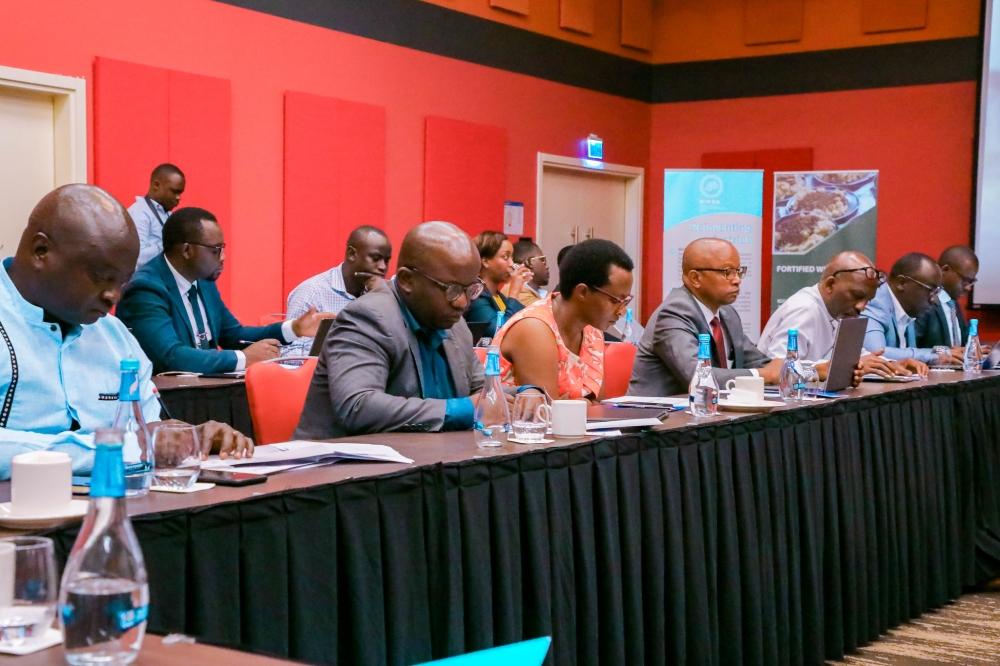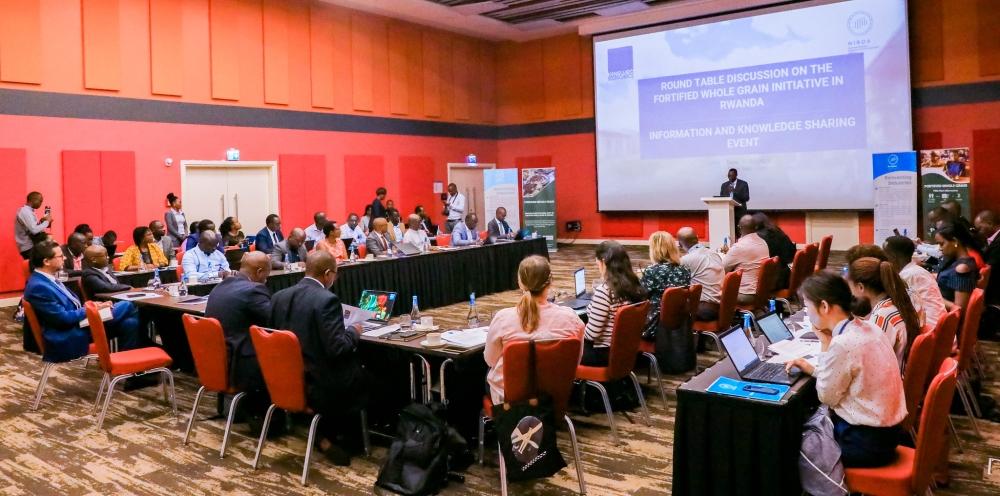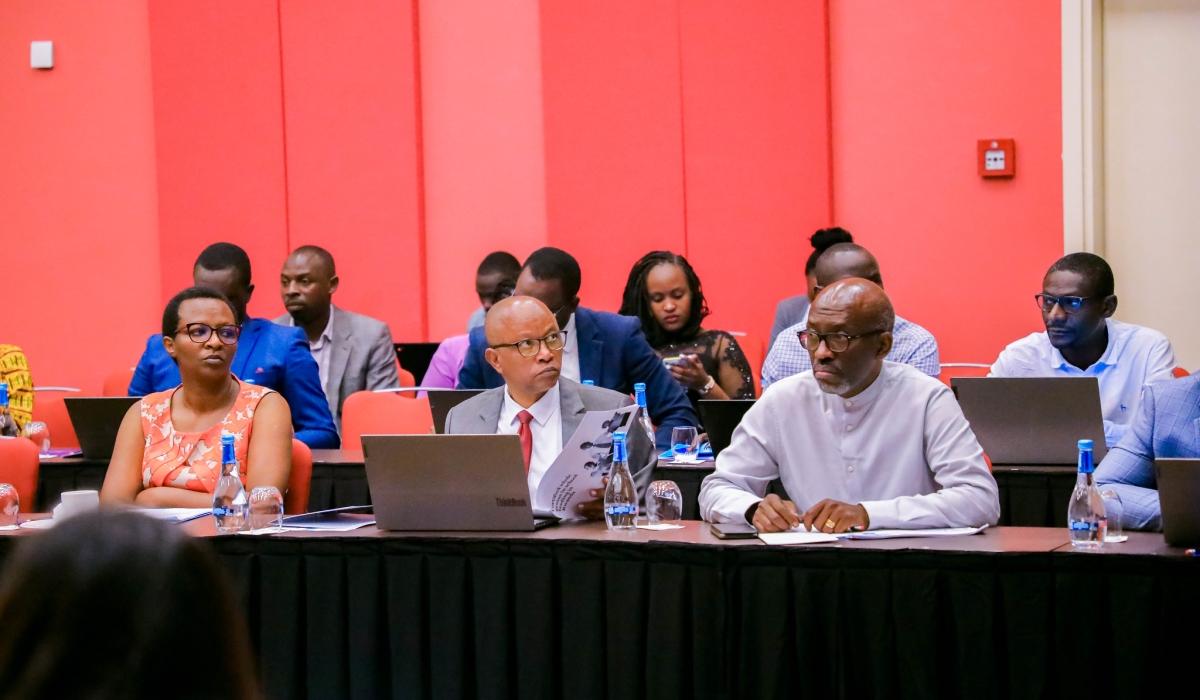Africa-Press – Rwanda. The program to feed school children with Fortified Whole Grain Maize flour that provides five times more nutrients than regular refined flour could extend to more schools across the country under the School Feeding Program to ensure the country raises children with physical and cognitive development
This was disclosed during an information and knowledge sharing event organized by Vanguard Economics in collaboration with National Industrial Research and Development Agency (NIRDA) to bring together researchers, agricultural experts and food chain stakeholders to elaborate more on Rwanda’s Fortified Wholegrain (FWG) initiative, on January 31.
The initiative was introduced and funded by the Rockefeller Foundation in Rwanda in 2020 to gradually supply fortified whole grains and derived products to replace refined maize flour schools and eventually consumer markets in Rwanda.
A whole grain is a grain of any cereal and pseudocereal that contains the endosperm, germ, and bran.To simply put it, the regular maize flour is produced from a small portion of the grain while the coat that has more nutrients is thrown away for animal feed. FWG maize flour is derived from the whole maize grain, providing consumers with an enriched flour.
Experts indicate that it is five times more nutritious and at almost the same price as the regular maize flour.
The pilot project covered 13,765 students from 18 schools in two districts Nyaruguru and Nyamagabe, and used FWG maize flour for use in meals over one school term, according to Vanguard Economics, the implementing partner.
Diane Dusabeyezu, Program Manager at Vanguard Economics, emphasized that the fortified wholegrain maize flour can contribute to reducing the prevalence of malnutrition and micronutrient deficiencies as major public health concerns in Rwanda.
“Providing nutritious food to school-aged children is crucial for their physical and cognitive development. Unfortunately, some children in various parts of the country do not have access to the necessary vitamins and minerals required for optimal growth and development,” she said.
“The consumption of fortified whole grain maize flour can contribute to reducing the prevalence of malnutrition and micronutrient deficiencies, which are major public health concerns,” she added.
Joining efforts towards more productivity
Dusabeyezu said that Vanguard Economics has signed an MoU with the National Industrial Research and Development Agency (NIRDA) to work together to scale up the project after the successful piloting.
Signed earlier this month, the MoU establishes a collaborative partnership that sets out clearly joint roles and responsibilities of each partner towards successful implementation of the Fortified Wholegrain (FWG) initiative.TNT: What reforms do you suggest regarding CIT and Withholding taxes?
BDO: In the newly enacted Corporate Income Tax law –about three months ago –there are some issues that still need to be addressed.
For instance, the Transfer Pricing policy regulating local subsidiaries of foreign companies is not yet clear and relevant on domestic price benchmarking database.
In addition, the requirement to prepare documentations conflicts with capping the management fees such as royalties and technical services sourced from foreign companies instating two percent of the turnover.
The 30 percent CIT is very high if we need to compete with other economies on international market. Our proposal is to reduce tax rate and increase lump sum base with purpose to reduce collection efforts and compliance cost.
This can be coupled with the introduction of a minimum CIT payable for loss making or lower tax payable, and the reduction of fiscal incentives to be replaced if need be by non-fiscal.
TNT: To conclude, would you say that the tax procedures and local administration of taxes are relevant?
BDO: For tax procedures, RRA should establish a way of whistleblowing for poor service delivery. In line with that, the fiscal campaign and tax compliance reminder should be educative and not intimidating.
We also propose that any new regulation should at least require a full tax period transition. The self-disclosure of non-registered taxpayers, takes very long process. In addition to that, the self-assessment principle should be followed and facilitate taxpayers to align declarations to RRA database.
This also goes in line with the need to have systems in sync with the tax procedures law, with regards to the the administrative fines that are assessed by the system, yet the law doesn’t provide that.
The recovery process of tax assessed during the audit, ignores the continuous appeal procedures allowed to taxpayers (appeal to the Commissioner General, amicable settlement and the court). RRA should not be in a hurry to recover the assessed amount while the taxpayer has more room to appeal.
Concluding, the Local administration of tax rates need to emerge from a well contextualized study on purchasing power, socio-economical, among others.It is expected that scaling up as part of the National School Feeding program could benefit 3.6 million children from pre-primary, primary and secondary schools across the country..
In addition, they will also increase the number of companies milling and supplying FWG to match the school demand with adequate supply.
Promoting the use of fortified food
Samuel Dusengiyumva, Permanent Secretary in the Ministry of Local Government, reiterated that the fortified whole grain initiative will have a positive impact on the health and wellbeing of the children in Rwanda.
“Our children need to grow and develop properly, and this initiative will help to reduce the effects of malnutrition in our country. It has the potential to improve health and nutrition which will eventually improve the education system, and a stronger and more resilient economy, moving forward,” he added.A number of children in the country suffer from various forms of malnutrition and it is estimated that around five percent of children under the age of five are stunted.
“We are encouraging the production of fortified foods, such as fortified whole grain, and we are promoting the use of fortified food in the school feeding program,” Dusengiyumva noted.
Meanwhile, Dusabeyezu noted that this increased capacity is critical to keeping the shift of school meals to FWG cost neutral, reduce risk of single supplier, and lay the groundwork for future expansion of production to match future school coverage.
“Doing so will deliver significant dietary and health gains across the continent to children through school meals and eventually the whole population through consumer market channels,”she said
The FWG Initiative is funded by the Rockefeller foundation and implemented by Vanguard Economics.
For More News And Analysis About Rwanda Follow Africa-Press











